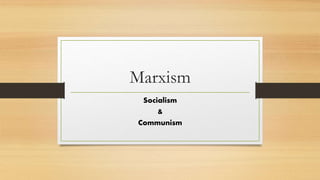
Lecture no. 6 marxism
- 2. Karl Marx’s Introduction Historian, Philosopher and Economist
- 3. Karl Marx, “the Philosophers have only interpreted the world in various ways; the point, however, is to change it.”
- 4. Marxism is a branch of socialism, a theory that holds that the more powerful classes oppress and exploit the less powerful by denying them their fair share of surplus they create. Defining Marxism
- 5. Capitalism •“Capitalism is a social and economic system based on private ownership of the means of production and free market system of trade and operation is for profit from the means of productions i.e. Farm, land, factory and other resources”. (Wikipedia)
- 6. The consequences of capitalism can be summarized as under Worst conditions of workers, housing and health Income inequality Child labour Hunger Rapid Urbanization (slums) Pollution
- 7. Socialism Population collectively owns and control means of production. The distribution of results is proportional and reflects a welfare society.
- 8. What is Communism Communism - a government where people shared work fairly and were paid equally. The word “Communism” comes from the Latin word “Communis” which means common or belonging to all.
- 11. Karl Marx Father of Communism
- 12. Karl Marx Introduction to the Theories
- 13. Theories of Karl Marx • The Law of Dialectical and Historical Materialism • The Theory of Class Conflict • Theory of Surplus • Theory of Alienation • Theory of Scientific Communism
- 15. Dialectical Materialism • Marx, Engels objected & rejected Hegel’s Idealist Interpretation • Hegel, external reality exist in human mind • Marx, nature & matter exist independent of mind • Material life is primary, spiritual is secondary • There is competition in economic infrastructure; force of production, relations of production Which came first? Idea or World World or Idea
- 16. Dialectic Modes of Production 1. Primitive mode of production 2. Ancient mode of production 3. Feudal mode of production 4. Capitalist mode of production 5. communist mode of production Phenomenon have some laws and patterns on basis of which future can be predicted. i.e., 1. Communism, slave, feudal, capitalism, …..?
- 18. Theory of Class struggle • Primitive Stage: Communist-classless society • Ancient Stage: Masters vs Slave • Feudal Stage: feudal lords vs landless serfs [peasants] • Capitalist stage: Proletariat vs Bourgeoisie • Communist Stage: Classless society
- 19. All stages have haves’ and have-nots’ Haves’ Have- nots’ Communism
- 21. Theory of Surplus ? Surplus value is equal to the new value created by workers in excess of their own labor-cost, which is appropriated by the capitalist as profit when products are sold. Pauperization: “Poverty is the result of exploitation, not scarcity”, Marx.
- 23. Theory of Alienation • Alienation means separation resulting from hostility • Alienation results in lose of interest in work, work becomes an enforced activity, not creative and satisfying one.
- 24. Socialism Population collectively owns and control means of production. The distribution of results is proportional and reflects a welfare society.
- 25. Socialism and its objectives Socialism Strengths Guarantee minimum standard of living “cradle to grave” Evens out differences - makes people more equal Workers enjoy full “fruit of labor” Full employment End of poverty Production is geared toward use not profit People have more control over their lives
- 26. Democratic Socialism Under this system, people have basic human rights and have some control over the government officials through free election. - however, the government does own the basic means of production and makes most economic decisions.
- 27. What is Communism Communism - a government where people shared work fairly and were paid equally. The word “Communism” comes from the Latin word “Communis” which means common or belonging to all.
- 28. 1755 - industrial revolution 1848 - Marx publishes Communist Manifesto 1920 - U.S. and Russia become friends by Communism 1922 - The U.S.S.R. forms Historical Background
- 29. Communism A political system in which the government owns all property and is ruled by one party with complete control over the economy. No private property will exist Every person will work for the welfare of all “From each according to his ability, to each according to his need”
- 30. Goal of Communism Social and Economic Equality End of Social Classes End of Capitalism
- 31. Characteristics of Communism Classless and Division less society No state or Government No Money based economy
- 32. Marxism can best be summarized as under Proletariat means workers and Bourgeoisie Capitalist/owners Conflict and Class Struggle Revolution will led to communism and socialism No Money or Concept of Private ownership
- 33. Gramscian: Antonio Gramsci In his notes he tries to answer of the question Q. Why had it proven to be so difficult to promote revolution in Western Europe? Ans. Use of the concept of hegemony Coercive practices and capabilities of the states Coercion kept alienated society from rising up and overthrowing the system
- 34. Bolshevik Revolution Set USSR state in 1922 Communist party of Russia End of Imperialism
- 35. Leninism He suggest a Communist Party to establish Communist State Party System Through Leadership Practical Ideology free off Utopianism.
- 36. Lenin; Class Struggle in not possible b/c of Core and Peripheries Core, Friedman Periphery, Friedman Semi- Periphery, Wallerstein
- 37. Friedman’s four level of Core & Periphery Pre-industrial stage Development of core & periphery Dispersion of economic activities in the periphery The emergence of spatial integration